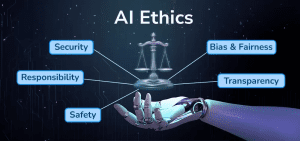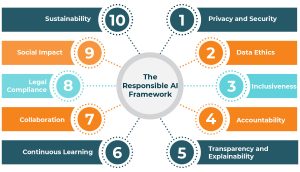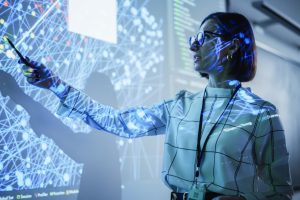Introduction
Artificial Intelligence (AI) is becoming a part of many industries, from healthcare and finance to transportation and entertainment. While it brings many benefits, such as improving productivity and solving complex problems, it also comes with important ethical challenges. These issues need careful attention. In this article, we will look at the main ethical problems with AI, including AI bias, privacy concerns, and the need for responsible AI.
What is AI Ethics?

AI ethics is about setting moral rules for how artificial intelligence systems are built and used. The goal is to make sure that AI benefits society and doesn’t harm people. As AI grows and becomes more powerful, discussions about how to make it ethical have become more important. AI has many advantages, but it can also bring risks that we need to manage carefully.
Major Ethical Issues with AI

1. AI Bias
AI systems learn from data, and often, the data used to train these systems reflect the biases that already exist in society. This can lead to AI making decisions that are unfair. For example, if an AI system is used to hire people, it might unintentionally favor candidates from certain backgrounds over others. This is especially concerning in areas like hiring, law enforcement, and lending, where biased decisions can affect people’s lives in big ways.
2. Privacy Concerns
AI systems can process large amounts of personal data. This raises serious concerns about privacy. AI can track what people do, what they like, and even predict what they might do next. In sensitive fields like healthcare, AI needs to be used very carefully to protect personal information. AI-driven surveillance systems can also invade people’s privacy if they are used without proper rules or oversight.
3. Accountability for AI Decisions
As AI becomes more independent, it becomes harder to decide who is responsible when something goes wrong. If an AI system makes a harmful decision, who should be held responsible? Is it the developers, the company that created the AI, or the AI itself? This is a critical issue, especially when AI is used in important areas like healthcare or law enforcement. It’s important to figure out who should be accountable for AI decisions.
4. Job Loss Due to AI
AI is also changing the job market. As machines and robots become smarter, many jobs that were once done by people might be automated. This could lead to unemployment for many workers in industries like manufacturing, retail, and even healthcare. The question is whether we should slow down AI development to protect jobs, or allow AI to continue growing, knowing it might lead to job losses. Helping workers who lose jobs due to AI find new opportunities is key to solving this problem.
5. AI’s Role in Decision-Making
AI systems are starting to make more decisions that affect people’s lives, but sometimes these decisions may not be based on values that humans care about. For example, in the criminal justice system, AI might help decide how long someone should be in prison, and in healthcare, AI might prioritize saving money over a patient’s health. It’s important that AI is used in a way that aligns with human values and ethics.
The Importance of Responsible AI

1. Transparency and Understanding
One way to ensure responsible AI is by making sure that people understand how AI systems work. It’s important that AI decisions are explainable, especially in sectors like healthcare, finance, or law. People need to trust AI systems, and they can only do that if they understand how they work and why they make certain decisions.
2. Reducing Bias in AI
To reduce bias, AI systems need to be trained with diverse and representative data. Developers should also test AI systems regularly to make sure they are not making biased decisions. It’s crucial for AI creators to prioritize fairness and inclusion to avoid reinforcing discrimination in society.
3. Protecting Privacy
Privacy is a big concern when it comes to AI. Developers must ensure that data used to train AI systems is collected with permission and is kept safe. People should have control over their personal data, and they should know how it is being used. Protecting privacy should be a top priority when designing AI systems.
4. Creating Clear Rules and Regulations for AI
Governments and organizations should set clear rules for how AI should be used. These rules should cover transparency, fairness, and accountability. Regulations can help make sure AI is used responsibly, especially in important areas like healthcare and criminal justice. International cooperation is also needed to create global standards for AI ethics.
The Risks of Not Regulating AI
If AI is allowed to develop without ethical guidelines, it could cause serious problems. AI could become a tool for discrimination, invasion of privacy, or even harm in warfare. That’s why it’s essential to have rules that guide how AI is developed and used. These guidelines should make sure that AI is used for good and not for harm.
AI in Healthcare: Saving Lives with Technology

AI is making a big difference in healthcare. It helps doctors diagnose diseases faster and more accurately, which can save lives. For example, AI can analyze medical images, like X-rays and MRIs, to find problems that a human doctor might miss. AI can also track patients’ health over time, offering doctors valuable insights that help them make better decisions about treatments.
AI in Education: Personalized Learning for Everyone
In education, AI is helping teachers and students. AI-powered tools can create personalized learning plans based on a student’s strengths and weaknesses. This means students can learn at their own pace, and teachers can provide more targeted help. AI also helps make education more accessible for people with disabilities, giving them tools that cater to their specific needs.
AI in Business: Making Work Smarter and Faster

AI is transforming the business world by improving efficiency. Companies use AI for customer support, inventory management, and even marketing. AI chatbots can instantly answer customer questions, and machine learning systems can predict what products people are most likely to buy. This makes businesses more efficient and allows them to focus on more important tasks.
AI and the Job Market: What the Future Holds
AI is changing the job market. While some jobs might be replaced by machines, many new jobs are being created that didn’t exist before. For example, we now need experts to develop, monitor, and maintain AI systems. However, it’s important to provide training and education for workers so they can adapt to these changes. With the right skills, people can take advantage of the new opportunities AI offers.
AI in the Environment: Helping the Planet
AI is also helping protect the environment. It can be used to track changes in the climate, predict natural disasters, and even help manage natural resources more efficiently. For example, AI systems can monitor forests to prevent illegal logging or help farmers use water more efficiently. These applications can lead to a greener planet by reducing waste and supporting sustainability.
The Ethical Responsibility of AI Developers

AI developers have a big responsibility. They must ensure their systems are fair, safe, and transparent. This means designing AI that doesn’t make biased decisions and protecting people’s privacy. Developers also need to make sure that AI doesn’t harm people or society, and they should always be ready to make improvements based on feedback and new discoveries.
The Limitations of AI: Understanding Its Boundaries
While AI has many benefits, it also has its limitations. AI is only as good as the data it learns from. If the data is incorrect or biased, the AI system can make mistakes. AI also lacks human qualities like empathy, which means it can’t always make decisions in the best interest of individuals. As we rely more on AI, it’s important to remember that it should be used as a tool to assist, not replace, human judgment.
The Challenges of AI: Problems We Need to Solve
Despite its benefits, AI comes with challenges. One of the biggest problems is bias AI systems can make unfair decisions based on the data they are trained on. Privacy is another concern, as AI systems use a lot of personal data. There are also fears about AI taking jobs away from people. To solve these challenges, we need better rules, fairness, and ways to protect privacy.
The Future of AI: What’s Next?

The future of AI is bright, but it will require careful planning. AI will continue to evolve and become even more useful in different fields, from healthcare to entertainment. However, to make sure AI is used in the right way, we will need to focus on developing it responsibly, with attention to fairness, transparency, and privacy. The future of AI could bring amazing changes, as long as we handle it wisely.
Comparative Table: Ethical Issues in AI
| Ethical Dilemma | What It Means | Possible Risks |
|---|---|---|
| AI Bias | AI might learn and repeat societal biases found in training data. | Unfair treatment in hiring, justice, and lending. |
| Privacy Concerns | AI can process personal data, risking privacy violations. | Loss of personal privacy, unauthorized surveillance. |
| Accountability | Hard to determine who is responsible for AI decisions. | Lack of accountability for harmful AI actions. |
| Job Displacement | AI might replace workers in many industries. | Unemployment, economic instability. |
| AI Decisions | AI might make decisions that don’t align with human values. | Harmful decisions in healthcare, law enforcement, etc. |
Analysis Table: Solutions for Ethical AI
| Issue | Solution | Benefits |
|---|---|---|
| AI Bias | Use diverse data, test for bias regularly. | Fairer outcomes, less discrimination. |
| Privacy | Protect personal data, use consent-based data collection. | Trust from users, better privacy protection. |
| Accountability | Create clear rules and assign responsibility for AI actions. | Clear responsibility for AI’s impact. |
| Job Displacement | Offer retraining programs and create new AI-related jobs. | Less economic disruption, job opportunities. |
| AI Decision-Making | Ensure decisions align with human values and ethics. | AI decisions that support well-being and fairness. |
Conclusion
Artificial Intelligence offers many benefits, but it also raises significant ethical dilemmas that need careful attention. Issues like AI bias, privacy, accountability, and job displacement require action from developers, businesses, and policymakers. By making AI more transparent, fair, and responsible, we can ensure that it benefits society without causing harm. With the right approach, AI can be a powerful tool for positive change.
Call-to-Action
What are your thoughts on ethical AI? Share your opinions and join the conversation on responsible AI development!












